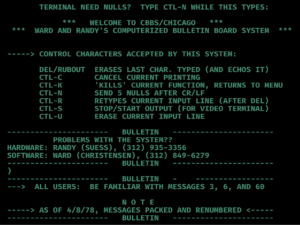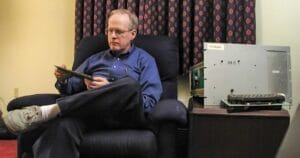With a degree in physics and chemistry from Milton (Wisc.) College, Christensen was hired by IBM as a systems engineer; he worked at IBM for his entire career. A classic computer nerd and hacker, when Christensen had a need for software, it probably didn’t exist so he wrote it himself. He wrote a cassette-based operating system for microcomputers before floppy and hard disks were common. When he lost the source code for some software, he wrote ReSource, a disassembler for the Intel 8080 processor, to re-create the source code. And when he needed to send files to his buddy Randy Seuss, he wrote XMODEM (1977), which was to figure in his biggest claim to fame. In his Byte magazine column for July 1983, Jerry Pournelle (Honorary Unsubscribe, 10 September 2017) wrote about software for early CP/M microcomputers, and said that “probably 50 percent of the really good programs were written by Ward Christensen, a public benefactor.”
Christensen and Seuss met at CACHE, the Chicago Area Computer Hobbyists’ Exchange. In January 1978, the Great Blizzard of 1978 hit Chicago, and both were stuck at home. Christensen and Seuss talked on the phone, and Christensen suggested there should be an automated computer system where someone could use a modem to dial up a central computer to upload or download files, which could use his XMODEM file transfer protocol. There wasn’t such a thing, so they decided to build it: Seuss took on building the S-100 hardware components, and Christensen (of course!) took on the software. “I thought of it being for the club,” Christensen said. “Randy said that just we two should do it — ‘committee projects’ just don’t go anywhere. So we just did it.” It only took three weeks before it went live on February 16, 1978, as CBBS — the Computerized Bulletin Board System. Seuss said it should be at his house since he lived in the middle of Chicago — a free phone call from anywhere else in the city.

It was the first-ever computer BBS. It couldn’t have been invented anywhere else: the snow, Christensen said later, “was so bad I couldn’t get to work. I shoveled for two hours, and then gave up. That’s why this couldn’t have been invented on the West Coast.” Amusingly, CBBS’s phone number ended in -8086 — “a happy coincidence,” he wrote, “as it existed long before the Intel chip” known by that designation. “I patterned the software after the ‘cork board and push-pins type of bulletin board’,” Christensen continued, “and coined the term ‘BBS’ for it.”

Christensen and Suess wrote an article in the November 1978 issue of Byte, “Hobbyist Computerized Bulletin Board”. The idea went wild, since Christensen made the design and software free to download. Hundreds of BBSes popped up around the country, and world. “BBSes introduced many home computer users to multiplayer online gaming, message boards, and online community building,” said ARS Technica, “in an era before the Internet became widely available to people outside of science and academia.” Christensen and Seuss’s role in jump-starting the online world was documented in a staggering 5-1/2-hour recounting, BBS: The Documentary, which took four years to complete and was released in May 2005. (It can be downloaded for free from its web site.)
In 1993, Christensen received the Pioneer Award from the Electronic Frontier Foundation for his role in creating XMODEM — “the major means of information exchange for computer hobbyists and small business users through the first decade of the personal computer revolution” — and the BBS. On CBBS’s 25th anniversary, Chicago Mayor Richard M. Daley declared it was “BBS Day” in honor of the world’s first BBS being created in Chicago. “I certainly love the way computers have made the world a much smaller place,” Christensen said in 2003. Christensen retired from IBM in 2012. Randy Seuss died December 10, 2019, at 74. Christensen’s friends hadn’t heard from him in a bit and asked police to check on him. He was found dead in his home on October 11. He was 78.
